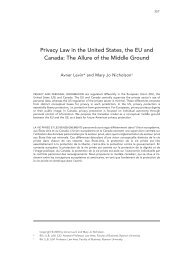Commentary on Fichte's “The Illegality of the Unauthorised ... - uoltj
Commentary on Fichte's “The Illegality of the Unauthorised ... - uoltj
Commentary on Fichte's “The Illegality of the Unauthorised ... - uoltj
Create successful ePaper yourself
Turn your PDF publications into a flip-book with our unique Google optimized e-Paper software.
(2008) 5:1&2 UOLTJ 141<br />
<str<strong>on</strong>g>Commentary</str<strong>on</strong>g> <strong>on</strong> Fichte 161<br />
In Fichte’s view, <strong>the</strong> utilitarian positi<strong>on</strong> reduces to moral relativism.<br />
According to Fichte, utilitarianism depends <strong>on</strong> <strong>the</strong> identificati<strong>on</strong> <strong>of</strong> human<br />
interests. By maximizing <strong>the</strong> fulfilment <strong>of</strong> <strong>the</strong>se interests, social welfare can be<br />
improved. However, completely opposing moral c<strong>on</strong>clusi<strong>on</strong>s can be reached<br />
depending <strong>on</strong> how <strong>the</strong>se interests are characterized. For instance, <strong>the</strong> thief in <strong>the</strong><br />
parable characterizes <strong>the</strong> interests <strong>of</strong> <strong>the</strong> author and <strong>the</strong> publisher in err<strong>on</strong>eous but<br />
intuitively appealing ways. For instance, <strong>the</strong> thief claims that an author’s welfare<br />
would be improved through greater disseminati<strong>on</strong> <strong>of</strong> <strong>the</strong> author’s ideas and<br />
works. Since disseminati<strong>on</strong> can be maximized through unauthorised reprinting, <strong>the</strong><br />
author’s welfare is increased through <strong>the</strong> denial <strong>of</strong> <strong>the</strong> author’s property interests.<br />
In essence, Fichte regards utilitarianism as dependent <strong>on</strong> a particular psychological<br />
anthropology. The welfare calculus is affected by whe<strong>the</strong>r we take <strong>the</strong> romantic<br />
view that <strong>the</strong> author derives happiness merely through communicati<strong>on</strong> <strong>of</strong> her<br />
creativity, <strong>the</strong> practical view that an author is a labourer seeking to use her creative<br />
talents as a means for earning m<strong>on</strong>ey, or <strong>the</strong> view that <strong>the</strong> author derives happiness<br />
from <strong>the</strong> recogniti<strong>on</strong> <strong>of</strong> her authorship <strong>of</strong> <strong>the</strong> work. Fichte seeks to oppose such a<br />
relativistic approach with a principled, rights-based approach.<br />
*<br />
9. TOWARDS A THEORY OF RIGHT: THE SEEDS OF FICHTE’S THEORY OF<br />
RIGHTS IN THE “PROOF OF THE ILLEGALITY OF THE UNAUTHORISED<br />
REPRINTING OF BOOKS”<br />
Having surveyed <strong>the</strong> arguments for <strong>the</strong> protecti<strong>on</strong> <strong>of</strong> intellectual property set<br />
out in “Pro<strong>of</strong> <strong>of</strong> <strong>the</strong> <strong>Illegality</strong> <strong>of</strong> <strong>the</strong> <strong>Unauthorised</strong> Reprinting <strong>of</strong> Books,” I will now<br />
trace <strong>the</strong> development <strong>of</strong> <strong>the</strong>se ideas in Fichte’s later works by addressing three<br />
main issues. First, in this early article, Fichte fails to distinguish between ethics<br />
and law. This differs from <strong>the</strong> Kantian approach—an approach later adopted by<br />
Fichte—which makes a clear distincti<strong>on</strong> between morality and legality. Sec<strong>on</strong>d,<br />
Fichte provides little justificati<strong>on</strong> in this article for <strong>the</strong> uniqueness <strong>of</strong> <strong>the</strong> form in<br />
which ideas are expressed. However, his later epistemological views will provide<br />
a fuller justificati<strong>on</strong> for <strong>the</strong> originality <strong>of</strong> each individual’s thoughts. Finally, I will<br />
argue that <strong>the</strong> article <strong>on</strong> <strong>the</strong> reprinting <strong>of</strong> books foreshadows <strong>the</strong> development<br />
<strong>of</strong> Fichte’s unique argument, presented in <strong>the</strong> Foundati<strong>on</strong> <strong>of</strong> Natural Right, that<br />
<strong>the</strong> idea <strong>of</strong> right is grounded in self-c<strong>on</strong>sciousness. In additi<strong>on</strong>, although Fichte’s<br />
early work in many ways parallels <strong>the</strong> development <strong>of</strong> Kant’s thought <strong>on</strong> <strong>the</strong><br />
nature <strong>of</strong> right, I will also highlight <strong>the</strong> differences between <strong>the</strong>m.<br />
9.1. The Relati<strong>on</strong>ship Between Morality and Legality<br />
Fichte’s later legal philosophy is characterized, like Kant’s, by a separati<strong>on</strong><br />
between morality and legality. The failure to clearly distinguish between <strong>the</strong>se<br />
two domains in “Pro<strong>of</strong> <strong>of</strong> <strong>the</strong> <strong>Illegality</strong> <strong>of</strong> <strong>the</strong> <strong>Unauthorised</strong> Reprinting <strong>of</strong> Books”<br />
is <strong>the</strong>refore <strong>on</strong>e <strong>of</strong> <strong>the</strong> work’s most noteworthy characteristics. As Luc Ferry points<br />
out, as late as 1793, when Fichte wrote <strong>the</strong> Beiträge zur Berichtigung der Ur<strong>the</strong>ile<br />
des Publicums über die französische Revoluti<strong>on</strong> [C<strong>on</strong>siderati<strong>on</strong>s to Correct <strong>the</strong>









